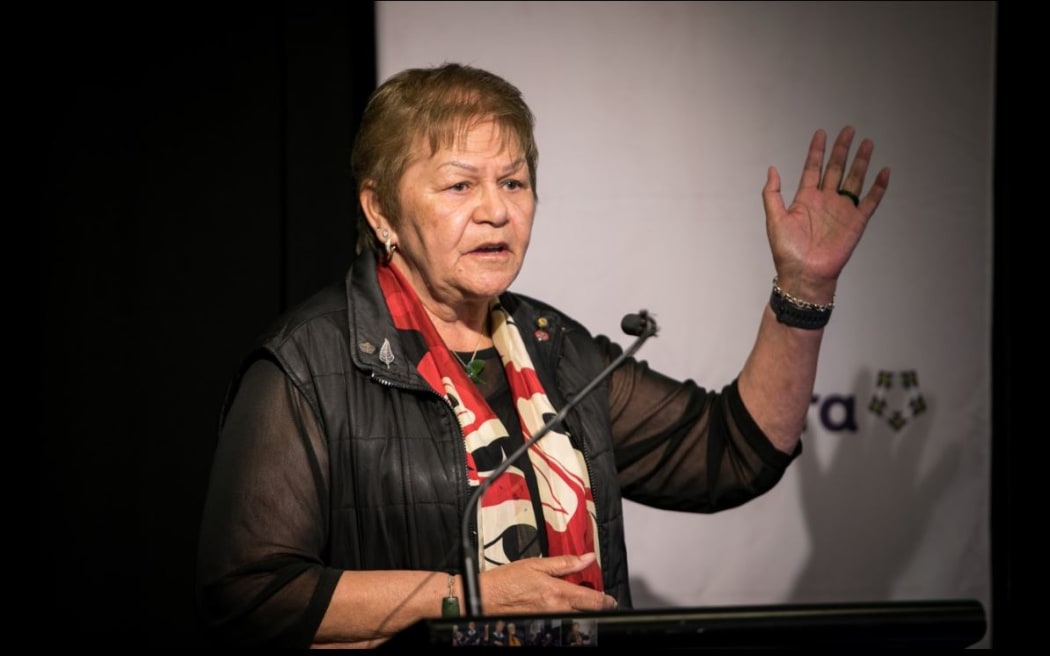
Dame Rangimārie Naida Glavish. Photo: NZME / Te Rawhitiroa Bosch
A woman whose use of the greeting 'kia ora' was so controversial it warranted intervention by the prime minister of the day has split views on the new government's approach to te reo Māori.
While she says eliminating pay allowances for public servants is "racist" against tangata whenua, Dame Rangimārie Naida Glavish supports stripping government departments of their Māori names unless they have earned the right to have one.
The National-NZ First-ACT government had only been in power a week before protesters took to the streets nationwide against its policies concerning Māori issues, including a plan to abolish the Māori Health Authority and undertake a review of all legislation that includes Treaty principles.
On Wednesday, Public Service Minister Nicola Willis told RNZ she was trying to figure out how to stop any more public servants getting extra pay for being proficient in te reo Māori. At present, more than a dozen state agencies pay te reo allowances between $500 and $3500 a year.
"I will... ask for advice on how we could stop these bonuses being negotiated into future collective agreements," Willis said.
Dame Rangimārie compared the ability to speak te reo with other qualifications that earn employees allowances on top of their base salary - using the example of doctors who can "actually understand their Māori patients".

Nicola Willis. Photo: RNZ / Marika Khabazi
"I think they're racist - there's no other word for it," she told Checkpoint on Wednesday. "And they need to understand the politics of their own party, because in 1984 it was Rob Muldoon who accepted 'kia ora' as a salutation indigenous to this country that the country needs to adopt."
Then a post office phone operator, Dame Rangimārie was demoted after refusing to replace the greeting 'kia ora' with an English phrase. Sir Robert -then the prime minister - intervened, and she ended up getting her job back.
"Don't they know that? Don't they know the politics of their own party?" she said.
Willis told reporters later in the afternoon she should have included more context in her original statement, saying she only opposed such bonuses "in circumstances where they're not relevant".
"I accept there will be many circumstances where receiving a bonus for te reo Māori use could be relevant to the job at hand."
The Māori Language Commission Te Taura Whiri said the allowances had expanded under governments of every stripe since the 1980s.
"Why would the government want to stop that? Simply because it's Māori? What else is it if it's not racist?"
[h] 'They are incapable and incompetent'
But what was not racist, according to Dame Rangimārie, was the new government's directive to agencies to primarily use their English names, rather than Māori.

Sir Robert Muldoon. Photo: Archives New Zealand from New Zealand [CC BY-SA 2.0 (https://creativecommons.org/licenses/by-sa/2.0)], via Wikimedia Commons
Transport Minister Simeon Brown has instructed the agency to refer to itself as 'New Zealand Transport Agency Waka Kotahi', rather than the other way around, as it has been doing in recent years.
"I'm glad, because reo Māori is not responsible for the potholes in our roads," Dame Rangimārie said - singling out Oranga Tamariki as particularly unworthy of a te reo name.
"The Iwi Chairs Forum gave Oranga Tamariki to the children so that they had used the concept of wellness of their children in looking after them in Oranga Tamariki - they are incompetent to hold that name, so I'm happy to see that one go as well.
"I think it should be earned and applied, and if they can't earn it and apply it, leave it alone. It was gifted, Oranga Tamariki was a gifted name by the Iwi Chairs Forum in this country, and it's never been able to uphold it at all."
She urged other government departments to "give us back our reo".
"They are incapable and incompetent to carry the concepts and the meanings of those names. It's not just a name - it's a concept of which one is expected to carry out, and they can't do it. Leave it alone."
Dame Rangimārie was made a Dame Companion of the New Zealand Order of Merit in 2017 and was president of Te Pāti Māori (then called The Māori Party) from 2013 to 2016, during which time it backed a National-led government.
She said the current coalition - which included National - should "enjoy their short-term" in power.

